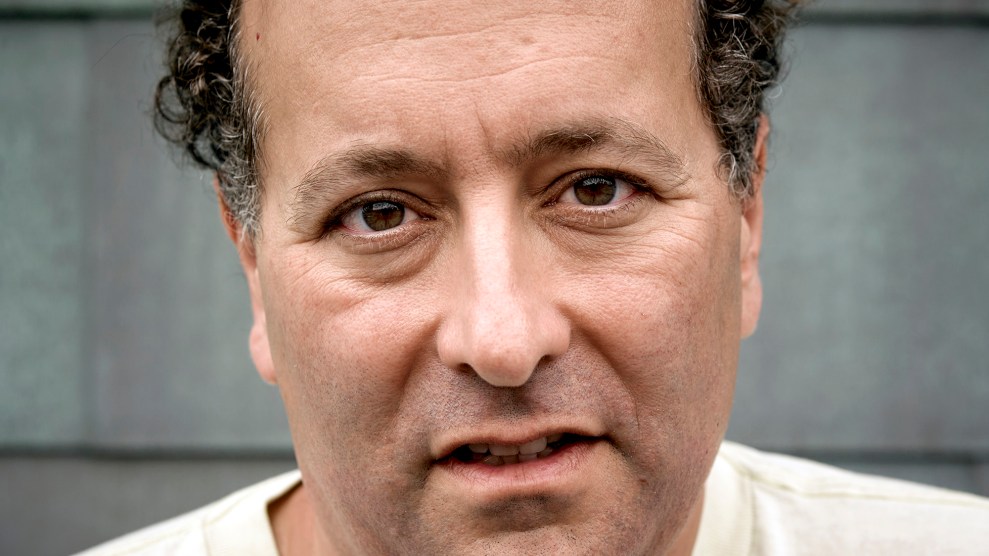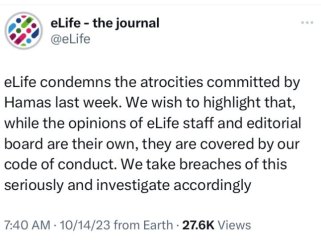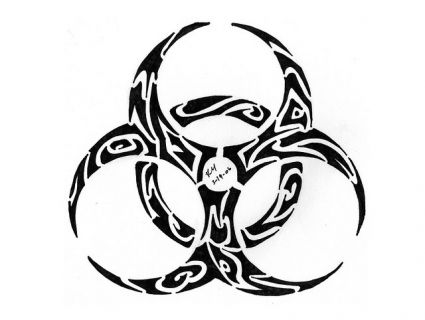
Michael EisenAndy Reynolds
The tweet that got Michael Eisen fired as editor-in-chief of a prestigious science journal seems less provocative with each passing day.
On October 13, less than a week after Hamas’ cold-blooded rampage near the Gaza-Israel border, satirical news outlet the Onion posted a brief article on X, headlined, “Dying Gazans Criticized For Not Using Last Words to Condemn Hamas.”
The piece, which, as the Onion does, uses dark humor to make a serious point—in this case about the mainstream response to the horrific attacks and the brutal retaliation already in progress—struck a chord with Eisen, a 56-year-old geneticist at the University of California, Berkeley.
Eisen is perhaps best known as a leader in the movement to transform science publishing. He’s also known for his outspokenness. That evening, frustrated by what he considered to be the “feckless” response of college and university administrators to the crisis, he reposted the Onion link on his personal account, with commentary.
The Onion speaks with more courage, insight and moral clarity than the leaders of every academic institution put together. I wish there were a @TheOnion university. https://t.co/R8gufC9opJ
— Michael Eisen (@mbeisen) October 13, 2023
The post went viral overnight, and resulted in his dismissal by eLife, the online journal where he’d served as editor since 2019.
Amid the raw emotions of the crisis (on social media, no less, with propaganda flying like shrapnel from all sides), nuance and context were early casualties and the public discourse has been ugly. Criticism of Israeli actions is conflated with (or deliberately portrayed as) antisemitism. Support for Palestinians is misconstrued as support for Hamas, and Palestinians are tarred as Hamas supporters—just as Jews are sweepingly (and derogatorily) branded as Zionists. Students are doxxed and blacklisted and student groups decertified for expressing unpopular opinions. Hate speech and violence targeting Jews and Muslims alike has spiked. In Illinois, a six-year-old Palestinian-American boy was fatally stabbed by his landlord shortly after the Hamas attacks. In California, an elderly Jewish man died following an altercation during competing street protests. Like I said, ugly.
By comparison, Eisen’s experience may seem inconsequential—he’s alive and well and a still tenured professor at a revered university—but the saga offers some useful insight into the way people and institutions are still struggling to thread the needle of free speech amid the heightened sensitivities, and complicated history, of an exceptionally volatile situation.
For the record, Eisen is Jewish, with relatives in Israel. Some family members are observant, he told me, others less so, but “pretty much everybody was very Israel-obsessed when I was a kid,” so “I’m very familiar with the history and the political discourse.”
His grandparents “would brook no criticism whatsoever of Israel and its politics and actions,” whereas some of the younger generations had issues with the way Israel treated the Palestinians. “For most of my childhood, I felt like Israel like was poised between a desire for peace and a desire for self-preservation,” he says. “And at some point that was replaced by a mentality, first in the settlers and the hard right, and then increasingly in the government, of people [who] were very racistly anti-Palestinian and supported and participated in violent acts, and just cruel things to make [Palestinian] lives increasingly miserable.”
Eisen remembers where he was on November 4, 1995, the day Prime Minister Yitzhak Rabin was assassinated. Rabin—who shook hands with the late Palestinian Liberation Organization (PLO) chairman Yasser Arafat at the White House in that iconic 1993 photo—was a force behind the Oslo Accords, the framework for a peace process aimed at fulfilling what the UN called “the right of the Palestinian people to self-determination.”
But the Oslo Accords infuriated both Hamas—which, unlike the PLO and its mid-1990s successor, the Palestinian Authority, never recognized Israel’s right to exist—and Israeli extremists, one of whom murdered Rabin after hard-right politicians, including Netanyahu, had riled up their followers. “I remember sitting in a car in Providence, Rhode Island, listening to the news and just like in tears, feeling like maybe the last chance to have a sane outcome was lost,” Eisen says.
After he reposted the Onion piece, a couple of people he knew replied to ask whether he condemned Hamas. Eisen answered that he did, and that he also was “terrified” by the ongoing collective punishment of the people in Gaza.
He figured that was the end of it. He was wrong. He went to bed and “by the time I woke up the next morning all hell had broken loose.”
Several Israeli scientists, incensed by his post, were agitating to get him fired from eLife. They and others vowed to stop submitting papers to the journal—some said they were stepping down as article editors or reviewers. In tweets and emails, they accused Eisen of anti-Israeli bias, and worse.
Tel Aviv University researcher Oded Rechavi reposted resignation announcements and suggested a new hashtag (#resignfromelife). He and others tweeted at eLife’s top funders, which include Max Planck Institute, Wellcome Trust, and Howard Hughes Medical Institute. Many X commenters expressed outrage, calling Eisen a “disgrace” or a “self-hating Jew”—at least one suggested he supported terrorism. The Onion aspect rankled many. “Is this a joke to you?” asked a senior researcher from the Weizmann Institute in Rehovot.
In a longer critique, Israeli researcher Uri Ben-David wrote that Eisen’s “extreme insensitivity toward his Israeli colleagues” and “clear bias against Israel” rendered him unable to judge the work of Israeli scientists fairly and therefore he should resign from eLife. He and others also took Eisen to task for not condemning Hamas.
Eisen bristles at all of this criticism. Finding fault with Israel and its response and condemning Hamas “are separate things,” he says. “First of all, it’s like, fuck you for saying I should condemn Hamas—of course I condemn Hamas! The idea that if I don’t literally issue a statement I’m not condemning them—it’s offensive.” (Indeed, a prominent scholarly declaration on anti-Semitism says it is anti-Semitic to require people, “because they are Jewish, publicly to condemn Israel or Zionism.”)
The post, he says, wasn’t directed at Israelis—who “are traumatized and in the middle of some shit”—but US college administrators. “I don’t buy the premise that I’m only allowed to speak on someone else’s terms,” he says. “The fact that people are like, ‘You’re a Hamas-supporting anti-Semite’ the second you say anything in support of Palestine—that is a bigger problem than the fact that I didn’t [explicitly condemn Hamas].”
Meanwhile, eLife, which is UK-based, issued a statement on X without consulting Eisen first:

Fede Pelish, a scientist who resigned from eLife‘s board of directors in protest of how everything went down, cited the journal’s (since deleted) post in his resignation letter, which he provided. “Do I agree with Dr. Eisen’s tweets? It doesn’t matter,” he wrote. “Unlike Dr. Eisen’s tweet, eLife’s tweet in response was not only an irrational, emotional response, but also carried the weight of the organisation…While an emotional reaction is understandable and expected from a social media platform, and people disgusted by Dr Eisen’s exercised their freedom of speech, logic and reason should guide an organisation’s reaction.”
The journal’s response merely amplified the uproar, Eisen says: “They made it about eLife. And they made it about the political stance by staking out what they portrayed as kind of an oppositional stance to mine.”
Eisen has never shied away from speaking his mind. He was—still is—a prolific presence on Science Twitter (now X), where he has more than 75,000 followers and nearly as many posts. He’s not the type to pull his punches, and is prone to dropping the F-bomb.
In fact, and this is relevant, Eisen, who studies the fruit fly genome, inadvertently sparked the silliest Twitter blow-up imaginable in 2020, when in response to an account asking people to name the “most overhyped animal” he jokingly nominated a rival research organism, the tiny roundworm C. Elegans.
C. elegans. They wiggle forward. They wiggle backwards. And occasionally they fuck themselves. That’s it. https://t.co/wYyXXViciJ
— Michael Eisen (@mbeisen) July 19, 2020
Some worm researchers didn’t find this so amusing, and eLife‘s board was unhappy with his language—“even though, in my opinion, using ‘fuck’ as a verb isn’t swearing,” Eisen says. “But whatever.” The board asked him to refrain from further cussing in personal Twitter posts, and he complied.
Seemingly more problematic, Eisen’s online critics unearthed a tweet from May 15, 2018, in which he’d simply written, “Fuck Israel.” They didn’t mention the context: The day before, Israeli forces had slaughtered more than 60 Gazans who’d rushed to the border fence to protest the designation of Jerusalem as Israel’s new capital. Thousands more were injured in what the Israeli newspaper Haaretz described as a “bloodbath.”
The post that got Eisen fired was inspired by statements from academic leaders that in his view were primarily crafted not to offend the wrong people—and then were modified on the fly in response to complaints from students, faculty, and donors. “Their statements aren’t heartfelt. They’re ChatGPT statements,” Eisen says. “And the general tenor in my reading of them was, Hamas is terrible. Israel has a right to defend itself. Palestinians are gonna die in response. And that sucks, but it’s gonna happen anyway.”
He was distressed by what felt like an institutional acceptance of the notion that the killing of innocents by Hamas somehow justified the killing of innocents by Israel. “And maybe you can’t have that conversation in any sane way in the immediate aftermath of a tragedy,” he says. “But the next phase wasn’t waiting. The bombs happened pretty quickly.” (Indeed, the retaliation had commenced almost immediately, as Netanyahu vowed a “mighty vengeance.”)
Hamas killed some 1,200 people on October 7, per Israeli authorities—about 70 percent of them civilians, the New York Times reported—and more than 240 were taken hostage. To date, the Palestinian Ministry of Health in Gaza reports that Israel’s retaliatory bombings have killed at least 11,100 people, including some 4,500 minors. And while those numbers have not been independently verified, US officials have conceded that the bombardment has killed thousands of civilians.
In response to the backlash to his post, Eisen tried to clarify his take.
The Onion is not making light of the situation. And nor am I. These articles are using satire to make a deadly serious point about this horrific tragedy.
— Michael Eisen (@mbeisen) October 14, 2023
That’s when the chair of the eLife‘s board sent him an email asking him to delete the original Onion post and to stop posting altogether. He refused to delete the post, he told me, “because that would be capitulating to what I thought was a really misdirected effort to silence any expression of support of Palestinians.” Instead, he temporarily deactivated his X account, which his critics interpreted as fleeing from the backlash.
Over the next few days, Eisen says, he spoke with the people at eLife, arguing that it was “ludicrous” to believe he harbored bias against Israeli scientists, with whom he works all the time, and that his problem was clearly with the Israeli government.
But he already had a “somewhat testy” relationship with the board. On his watch, eLife had embraced a radical new publishing model called “publish-review-curate.” The journal would no longer make up-or-down decisions as to which papers to accept. Instead, it would publish them all, along with comments from the journal’s reviewers. Plenty of people were resistant to the new model (which eLife says it will continue). Some “had it in for me, and they started piling on and being like, ‘Mike’s an embarrassment, he’s unprofessional,’” he says.
The board summoned him in and asked him to explain himself. Then its members went into a private session. A few hours later, Eisen says, a board member called and told him the board was asking him to resign: “I said, ‘No, I can’t resign under these circumstances, because first, it’s a bad decision for eLife.’ Second, it would be an admission that this was a bad thing, and I don’t think it was.”
When he learned the board was securing his replacement, he announced his firing on X. The journal released a statement the same day thanking him for his service, and asserting that Eisen’s dismissal was based on past issues as well: “Mike has been given clear feedback from the board that his approach to leadership, communication and social media has at key times been detrimental to the cohesion of the community we are trying to build and hence to eLife’s mission. It is against this background that a further incidence of this behaviour has contributed to the board’s decision.”
Eisen is incredulous. “They were referring to that fucking worm thing. I’m not even kidding!” he says. There also had been, he admits, some “internal brouhahas in which my style of communicating with people who are trying to have me fired was not up to what they wanted…But when the board asked me to change the way I communicated, I always did.”
Tensions between a nonprofit’s leaders and board are “par for the course,” he told me. But it is “just silly” for eLife to try and link his firing to past disputes. The Onion dust-up “was outside of the scope of my employment. It had nothing to do with eLife.”
Just as some Israeli scientists vowed to cut ties with eLife because of Eisen’s post, others—deputy editors, senior editors, and reviewing editors, along with board member Pelish—stepped down in protest of his firing. Eisen says he’s heard from “dozens” that they’d resigned, although he says he has no way to verify that.
Besides Pelish, the few former eLife staffers I reached out to did not respond to emails. I did hear from Rasmus Nielsen, a longtime Berkeley colleague, who describes Eisen’s dismissal as “a real injustice.”
“Mike essentially voiced the opinion that Palestinian civilians should not be collectively punished for the crimes of Hamas. I find that viewpoint uncontroversial and fully in line with international law,” Nielsen said in an email. “The fact that a coordinated online effort managed to get him fired,” he added, “sets an unfortunate precedent and I fear that it will contribute to an environment where other academics, particularly younger and less established researchers, do not dare to speak up.”
Eisen is very clear that eLife had every right to fire him. “That’s their call,” he says. “I think that they panicked and were overwhelmed by a Twitter mob and didn’t function properly, and made a stupid decision in their tweet, and they made a bad decision in deciding to replace me under those terms. I think they did more damage to eLife than my tweet possibly could have.”
Even in hindsight, Eisen says he probably wouldn’t have acted much differently: “I never got into this world to squelch my morals in favor of having a job.” And although “one tweet is inadequate to express an entire worldview on something that I’ve been thinking about for a half-century,” he says, “I don’t regret it. If anything, I regret not having been a little bit more forceful.”
There’s little doubt that Eisen’s timing, so soon after the attacks, was hurtful to the Israeli scientists. Yet it’s also true that Israel’s retaliation wasn’t waiting for anyone to grieve. Beyond social media, positive response to his outspokenness has been “huge,” Eisen says. An open letter to eLife from researchers protesting his firing has gathered nearly 2,000 signatures.
He’s also gotten hundreds of positive emails—too many to respond to, he says—many from Palestinian and Arab scientists in the United States who were frustrated by “the lack of expression of concern for their families and their people” in academic circles, and science in particular. “They found it ghastly and they felt abandoned,” Eisen says. “So many people were so thankful that somebody in science in a position of some power is willing to say this simple thing, just like, Palestinians are humans and we should treat them as such.”
















